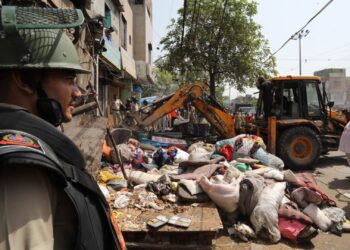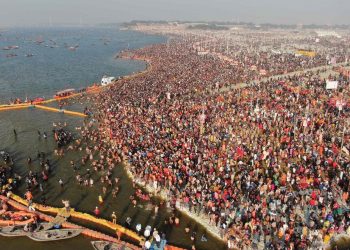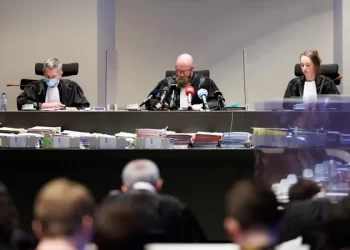Human Lives Human Rights: Two civilians were killed in Monday’s gunfight in Indian controlled Kashmir, resisting the families to perform proper funeral of their loved ones.
Indian security forces killed Businessmen Altaf Ahmad Bhat and Dr. Mudasir Gul in a fake encounter in the Hyderpora area of Srinagar, using the two civilians as human shields in the standoff.
Police said the rebels included a Pakistani citizen, but offered no evidence. They also described one of the civilians as an “overground worker,” a term Indian authorities use for rebel sympathizers and their civilian supporters.
The security forces buried Bhat and Gul in Handwara, around 70km from Hyderpora, without their families being present, citing “law and order concerns”.
Over the last two years, authorities have buried the bodies of hundreds of suspected rebels and their alleged associates, including civilians, in unmarked graves in remote areas, denying their families proper funerals, where as it must be noted far from law and order showing these unmarked graves as terrorist graves helps them in promotion of their government positions.
The families of the two civilians staged a sit-in at the Press Enclave in Srinagar on Wednesday and held a candle-light vigil after the day-long protest, demanding that the bodies of the two men be handed to them. They were forcibly removed from the site by police around midnight and a few of them were even detained.
National Conference leader and former chief minister Omar Abdullah on Thursday staged a sit-in demanding the return of bodies of the two men.
“We are sitting here peacefully. If we wanted, we would have blocked roads, bridges, but no. There has been no sloganeering, no law and order disturbance and no road has been blocked. We are not raising a voice against the government, we just demand that the bodies be returned,” he said.
Following widespread public outrage, the bodies of Mohammad Altaf Bhat and Mudasir Gul, a dental surgeon and real estate dealer, were exhumed late Thursday in presence of government officials and a team of doctors.
Family members said authorities asked them to bury the two in presence of only close relatives and immediate neighbors, fearing the funerals could turn into anti-India protests.
Authorities have said the policy is aimed at halting the spread of the coronavirus and to avoid unrest during funerals.
The policy has added to widespread anti-India anger and some rights groups have fiercely criticized it as a violation of religious rights. Rights groups also have said that investigations into the killings rarely result in prosecutions and are often aimed at calming public anger.
“These probes in the past have never resulted in providing justice to the aggrieved. It helps the state in buying time and tiring the families,” said Parvez Imroz, a prominent rights lawyer who heads the Jammu-Kashmir Coalition of Civil Society.
Kashmiris for years have accused Indian troops of targeting civilians and committing abuses with impunity.
Such allegations include staging gunfights and then saying the innocent victims were militants so that Indian troops can claim rewards and promotions. Indian officials acknowledge the problem but deny abuses are part of a strategy. They have also said the allegations are mostly separatist propaganda meant to demonize troops.
“The probes, if done honestly, may only help to know the truth but not establish justice,” said Imroz.
Both India and Pakistan claim divided Kashmir in its entirety. Rebels in the Indian-controlled portion of the region have been fighting New Delhi’s rule since 1989.
India insists the Kashmir militancy is Pakistan-sponsored terrorism. Pakistan denies the charge, and most Kashmiris consider it a legitimate freedom struggle. Tens of thousands of civilians, rebels and government forces have been killed in the conflict.


















